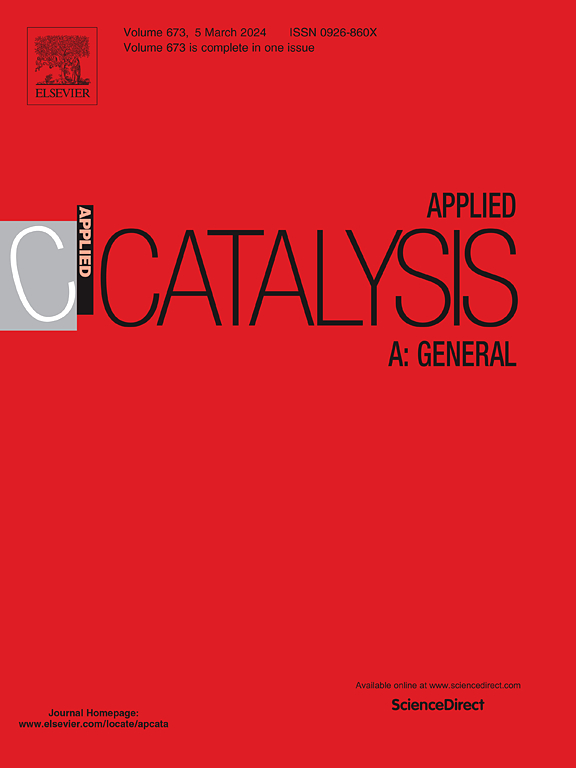通过还原-氧化处理提高 CTAB 改性 ZIF-67 衍生空心 Co3O4-CNT 催化剂的丙烷氧化性能
IF 4.7
2区 化学
Q2 CHEMISTRY, PHYSICAL
引用次数: 0
摘要
Co3O4 是丙烷全氧化的有效催化剂,ZIF-67 高温分解通常用于生产钴基催化剂。然而,高温热解通常会导致结构坍塌和钴活性降低。本研究提出了一种 CTAB 改性 ZIF-67 衍生的空心 Co3O4-CNTs 催化剂,用于增强丙烷全氧化。该催化剂是通过 800 °C 下的 H2/Ar 还原和随后 300 °C 下的空气氧化合成的。这一过程保留了 ZIF-67 的立方结构,并产生了大量的 CNT,从而限制了 Co3O4 的生长,并获得了优异的催化活性,T90 % 为 230 °C,低于贵金属催化剂。氧化温度升高会导致 CNT 减少、Co3O4 颗粒生长和结构崩溃。300 °C 煅烧催化剂(300 A)因其 Co3O4 颗粒最小和优异的还原性而表现出最佳性能,而更高的温度则会导致颗粒团聚和活性降低。本文章由计算机程序翻译,如有差异,请以英文原文为准。
Enhancing propane oxidation with CTAB-modified ZIF-67-derived hollow Co3O4-CNTs catalysts through reduction-oxidation treatment
Co3O4 is an effective catalyst for propane total oxidation, and ZIF-67 pyrolysis is usually used to produce cobalt-based catalysts. However, high-temperature pyrolysis often leads to structural collapse and reduced cobalt activity. This study presents a CTAB-modified ZIF-67-derived hollow Co3O4-CNTs catalyst for enhanced propane total oxidation. The catalyst was synthesized through H2/Ar reduction at 800 °C and subsequent air oxidation at 300 °C. This process preserved the cubic structure of ZIF-67 and produced abundant CNTs, which limited Co3O4 growth and resulted in superior catalytic activity, with a T90 % of 230 °C-lower than that of noble metal catalysts. Increasing the oxidation temperature led to a decrease in CNTs, growth of Co3O4 particles, and structural collapse. The 300 °C calcined catalyst (300 A) showed the best performance due to its smallest Co3O4 particles and excellent reducibility, while higher temperatures led to particle agglomeration and decreased activity.
求助全文
通过发布文献求助,成功后即可免费获取论文全文。
去求助
来源期刊

Applied Catalysis A: General
化学-环境科学
CiteScore
9.00
自引率
5.50%
发文量
415
审稿时长
24 days
期刊介绍:
Applied Catalysis A: General publishes original papers on all aspects of catalysis of basic and practical interest to chemical scientists in both industrial and academic fields, with an emphasis onnew understanding of catalysts and catalytic reactions, new catalytic materials, new techniques, and new processes, especially those that have potential practical implications.
Papers that report results of a thorough study or optimization of systems or processes that are well understood, widely studied, or minor variations of known ones are discouraged. Authors should include statements in a separate section "Justification for Publication" of how the manuscript fits the scope of the journal in the cover letter to the editors. Submissions without such justification will be rejected without review.
 求助内容:
求助内容: 应助结果提醒方式:
应助结果提醒方式:


